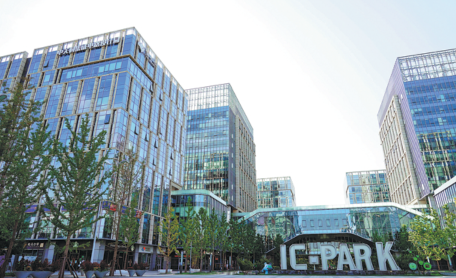High-tech businesses thriving in capital city
Beijing has been committed to fostering high-tech industries as part of its efforts to build itself into a global scientific and technological innovation center during the 14th Five-year Plan period (2021-25).
The capital aims to cultivate four to five high-tech industries valued at more than 1 trillion yuan ($137.91 billion) by 2025, said the development plan it issued in 2021.
More efforts are needed to develop two industries that have international influence and another four advantageous industries, the plan said. These include the new-generation information technology, integrated circuits, green energy, and medicine and healthcare.
Beijing is the first city in China to win approval in building an artificial intelligence innovation development pilot zone. Its AI industry has maintained stable growth momentum in recent years, with a complete industrial chain basically established.
The capital is now home to more than 1,600 AI-related companies, including AI giants such as Baidu and ByteDance, ranking first among cities across the country, according to data from the Beijing Science and Technology Commission and Administrative Commission of Zhongguancun Science Park.
Beijing offers AI startups an abundance of resources including talents, capital and favorable policies, said Huang Wei, CEO of Unisound, a leading AI voice service provider.
"We are among enterprises that have grown up in the Zhongguancun Science Park in Haidian district, which is known as Beijing's tech hub," Huang said, adding the atmosphere there is very conducive to innovation.
Last year, Beijing's AI sector recorded 207 billion yuan ($28.48 billion) in output value, up 11 percent year-on-year and that is expected to reach 227 billion yuan in 2022.
Benefiting from AI technologies, industries such as finance and medicine have sped up their upgrading, officials said.
Founded in 2016, Keya Medical is one of the top AI-driven medical device manufacturers in China. The AI products of the company have been approved for sale in 11 cities and provinces so far.
In addition, it has built an AI laboratory in collaboration with Beijing Anzhen Hospital in the city's Chaoyang district, which is designed to advance research on robotic surgeries, precision medicine and medical image analysis.
The capital leads the country in gene therapy and stem cell therapy as well as the development of COVID-19 vaccines and drugs.
China's first approved COVID-19 antibody drug is the monoclonal neutralizing antibody cocktail jointly developed by biotech company Brii Biosciences, Tsinghua University in Beijing and the Third People's Hospital of Shenzhen in Guangdong province.
The Sinopharm and Sinovac Life Sciences, both headquartered in Beijing, facilitated international cooperation in epidemic prevention as they produced and distributed 5.5 billion doses of inactivated vaccines around the world, officials said.
Last year, Beijing's medicine and healthcare industry reported a year-on-year increase of 116.7 percent in its revenue.
Other high-tech industries such as advanced manufacturing and intelligent-connected vehicles also achieved remarkable progress.
Beijing has become one of the ICV centers in China in terms of testing road length and the number of test licenses granted, said the Beijing Bureau of Economy and Information Technology.
Zhongguancun Science Park was home to about 2,000 advanced manufacturing enterprises in 2021, which generated more than 920 billion yuan in combined revenue. The park has contributed about one-third of the total industrial revenue of the country's IC sector.
Despite the impact of COVID-19 outbreaks, investment in the city's high-tech manufacturing surged 78.1 percent year-on-year during the first half of the year. High-tech industries and emerging industries played a role in bolstering the economy amid uncertain conditions, officials said.

The IC Park in the Zhongguancun area is a center for integrated circuit design and production in Beijing. REN CHAO/XINHUA
